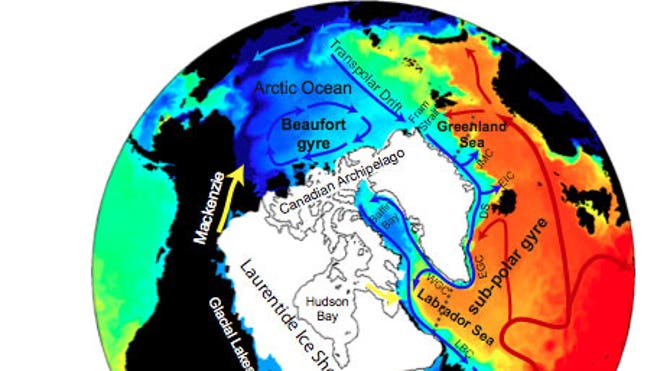Scientists study how Earth’s oceans plunged the planet into a catastrophic big freeze

November 7, 2012 – CLIMATE - A giant flood of Arctic meltwater may have triggered an ancient 1,200-year-long chill nicknamed the “Big Freeze,” the last major cold age on Earth, a new study finds. These findings suggest that changes in the flow of water in the Arctic could suddenly alter the modern climate, study investigators added. Starting about 12,900 years ago, the Northern Hemisphere was abruptly gripped by centuries of cold, an era technically known as the Younger Dryas.
Scientists have suggested this chill helped wipe out most of the large mammals in North America as well as the so-called Clovis people. The Big Freeze was not a glacial period, which is colloquially often called ice ages — it was a cold time in the relatively warm spans between glacial periods. Although researchers have suggested a cosmic impact might have set off this Big Freeze, the prevailing theory for the cause of the Younger Dryas was a vast pulse of freshwater— a greater volume than all of North America’s Great Lakes combined — that poured into the Atlantic and Arctic Oceans.
The source of this flood was apparently the glacial Lake Agassiz, located along the southern margin of the Laurentide Ice Sheet, which at its maximum 21,000 years ago was 6,500 to 9,800 feet thick and covered much of North America, from the Arctic Ocean south to Seattle and New York.
“The flood was likely caused by the sudden breaking of an ice dam,” said researcher Alan Condron, a physical oceanographer at the University of Massachusetts at Amherst.
“Prior to the flood, meltwater is thought to have drained into the Gulf of Mexico, down the Mississippi River. After the dam broke, the water rapidly flowed into the ocean via a different river drainage system.”
This deluge would have diluted the circulation of saltwater in the North Atlantic, disrupting the ocean “conveyer belt” that cycles warm water up to the Arctic, where it cools and sinks and travels back south along the ocean floor. With less warm seawater moving poleward, temperatures across the Northern Hemisphere apparently plunged. –Daily Mail

沒有留言:
張貼留言